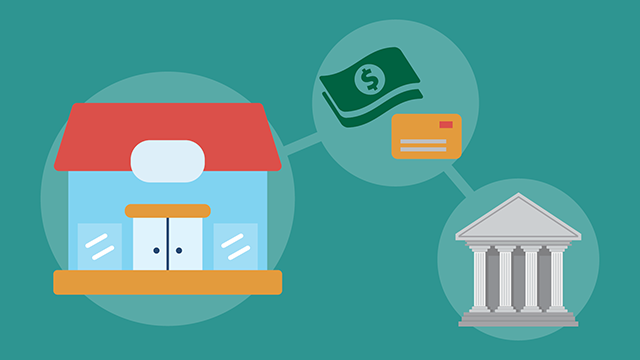The Role of Credit Scores in Securing Small Company Loans for Entrepreneurs
In the affordable landscape of entrepreneurship, safeguarding a bank loan typically pivots on the crucial aspect of debt scores. These ratings offer as a numeric depiction of a business owner's credit reliability, influencing lenders' choices and the terms offered. A higher credit history can open doors to desirable funding conditions, while a reduced rating might offer considerable obstacles. Yet, what specifically influences these scores, and how can business owners tactically enhance them to enhance their chances of protecting vital financing? The response to these inquiries hold the key to unlocking possible growth possibilities for tiny organizations.
Understanding Credit History
Credit history scores are vital numerical representations of a person's credit reliability, acting as a crucial aspect in financial decision-making for lenders. These scores are acquired from a detailed evaluation of a person's credit rating history, encompassing facets such as settlement background, debt use, length of credit report, brand-new credit history accounts, and sorts of credit score utilized. Typically varying from 300 to 850, greater ratings signify lower threat to lending institutions, while lower ratings indicate greater risk.
The estimation of credit rating is accomplished by credit bureaus utilizing exclusive formulas, with the most widely acknowledged models being FICO and VantageScore. Each model may weigh variables slightly differently, however they all purpose to offer a regular action of credit rating risk. A strong credit scores score shows the person's reliability in managing financial debt, making timely payments, and keeping a healthy balance between credit rating made use of and available debt.
It is essential for individuals and local business owner to understand their credit history scores, as these numbers can have far-ranging ramifications beyond individual finance. Regularly checking one's credit record, dealing with errors, and taking on sound financial habits can considerably boost credit rating ratings, thereby boosting the individual's general financial account and creditworthiness.
Value for Finance Authorization
Comprehending one's credit history is foundational, as it plays a substantial role in the procedure of loan authorization for small companies. Lenders utilize credit report as a key metric to evaluate the creditworthiness of candidates. A strong credit history indicates a history of accountable financial behavior, recommending to lenders that the applicant is most likely to settle the financing on schedule. A high credit scores rating can dramatically enhance a business owner's opportunities of securing a loan with beneficial terms, including reduced interest prices and more adaptable repayment choices.
In comparison, a low credit rating may signal possible risk, leading loan providers to either reject the finance application or enforce more stringent problems. This makes it essential for entrepreneurs to be familiar with their credit scores standing, as it straight impacts their capability to gain access to funding. In addition, credit rating function as a standard measure that enables lenders to enhance their decision-making procedure, making certain effectiveness and uniformity. As little organizations often require timely accessibility to funds for development and sustainability, keeping a durable credit report rating comes to be crucial. Hence, understanding and managing one's credit history score is a crucial element of preparing for loan applications and attaining organization success.
Elements Affecting Ratings
Several aspects add to the resolution of a credit rating rating, each playing a critical duty in shaping an individual's credit score account. A high ratio of utilized debt to offered credit report can recommend economic overextension, detrimentally influencing creditworthiness.
Length of credit rating additionally elements into credit history computations, with a much longer credit report usually seen more positively. This metric gives insight into the person's long-lasting economic habits, offering lenders read this article a broader viewpoint on their credit management skills. In addition, the types of credit scores in use are thought about, as a mix of charge account, such as rotating charge card and installment lendings, can demonstrate the ability to handle various economic obligations.
Last but not least, current credit report inquiries might influence ratings (pre approval student loans). Constant applications for brand-new credit can show financial distress, hence adversely affecting ball game. Each of these elements is vital in the extensive analysis of a credit report, influencing an entrepreneur's ability to safeguard a small service finance
Improving Your Credit Rating
Improving one's credit scores score is similar to nurturing a yard; careful attention to vital locations can produce considerable improvements. Repayment background comprises a substantial part of a click for info credit history score; hence, establishing up automated repayments or pointers can assist maintain consistency. High credit rating utilization ratios, or the amount of credit report made use of relative to the credit report limit, can negatively affect scores.

Last but not least, preserving older credit score accounts can positively affect the ordinary age of credit scores, which is an additional aspect in racking up models. While brand-new credit report questions need to be lessened to avoid momentary rating dips, accountable credit scores management over time will naturally bring about score renovation, therefore boosting eligibility for desirable small organization funding terms.
Alternate Financing Alternatives
Business owners with less-than-ideal credit scores may find these options not only a lot more obtainable however likewise tailored to their unique business demands. These platforms commonly offer faster authorization procedures and even more versatile terms than traditional financial institutions, often considering variables past credit report scores, such as service performance and money flow.
One more feasible choice includes crowdfunding, where entrepreneurs can increase resources from a huge pool of tiny financiers via systems like Kickstarter or Indiegogo. This method not only supplies funds however additionally verifies business concepts through direct engagement with prospective consumers. Additionally, microloans, often provided by not-for-profit companies, satisfy small companies and start-ups. They provide smaller sized finance quantities with reduced rates of interest, making them optimal for entrepreneurs that need limited funding.
Billing financing and vendor cash developments are also worth considering. The former entails marketing outstanding billings to a loan provider at a price cut, while the last provides an advancement on future sales. Both options can enhance capital without the rigorous credit score demands of standard financings.
Final Thought

These ratings are acquired from a thorough analysis of a person's credit score background, including facets such as payment background, credit history usage, length of credit history, new credit history accounts, and types of credit history made use of (pre approval student loans). A strong credit rating rating shows the person's reliability in taking care of financial obligation, making timely settlements, and keeping a healthy balance in between credit score made use of and available credit history
